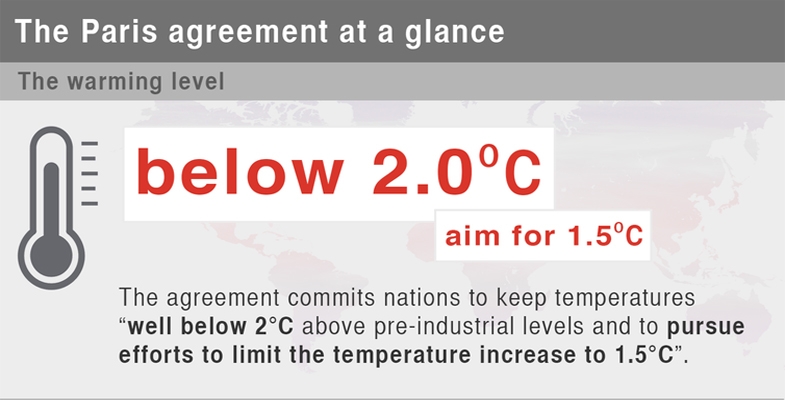The speaker at STEP’s AGM on 30 October was Lesley Hughes, Distinguished Professor of Biology from Macquarie University, who has been studying the impacts of climate change on ecosystems for many years. She has been a leading contributor to reports produced by several expert bodies such as the Intergovernmental Panel on Climate Change (IPCC) and Australia’s Climate Commission. She gave a stark outline of the changes to ecosystems that have been happening and the prospects in years to come under the possible scenarios for temperature increases.
The global body assessing the issue of climate change is the IPCC. Their reports are published after rigorous analysis of thousands of scientific reports.
Early in October the IPCC released a special report commissioned at the breakthrough 2015 summit that brokered the Paris climate agreement. It sets out the key differences between the Paris agreement’s two contrasting goals: to limit the increase in global temperatures over pre-industrial levels (mid-nineteenth century) to ‘well below’ 2°C, and to ‘pursue efforts’ to limit warming to 1.5°C. The agreement also aimed to increase the capacity of countries to deal with the impacts of climate change and provide finance for measures to reduce greenhouse gas emissions.
Emissions Reduction Commitments
The 196 countries signing the agreement made statements of commitments to reduce emissions by 2030. However the national pledges that have been made are not enough to remain within a 3°C temperature limit let alone a 2°C limit. They are not even enforceable. The only result of not meeting the commitment is to be named and shamed.
Australia’s commitment was a reduction of 26 to 28% below 2005 levels. We were making progress towards that goal when the carbon tax was introduced but we have gone backwards since 2014 with a reduction of only 11% by 2017. With current policies we haven’t a hope of meeting the goal.
What is the Expected Impact of 1.5°C of Warming?
Although the Paris agreement aims to hold global warming as close to 1.5°C as possible, that doesn’t mean it is a ‘safe’ level. In 2017 the increase in global average temperatures reached 1°C. Communities and ecosystems have already suffered significant impacts from extreme weather events and drought. If the planet continues to warm at the current rate of 0.2°C per decade, we will reach 1.5°C of warming by around 2040.
But there is a lag between the timing of carbon emissions and temperature increases. The IPCC uses the concept of a carbon budget, the projection of the quantity of emissions that can occur in order to limit warming to a certain level. At current emissions rates, within the next 10 to 14 years there is a two-thirds chance we will have used up our entire carbon budget for keeping to 1.5°C. It is inevitable that temperatures will increase by more than 1.5°C unless policies are implemented now to reduce emissions drastically as quickly as possible.
What Difference does 0.5°C Make?
Impacts on both human and natural systems would be very different at 1.5°C rather than 2°C of warming. The report tries to quantify the differences to give a tangible scale to the information. For example:
- The proportion of the global population exposed to water stress could be 50% lower than at 2°C. Food scarcity would be less of a problem and hundreds of millions fewer people, particularly in poor countries, would be at risk of climate-related poverty.
- At 2°C extremely hot days such as those experienced in the northern hemisphere this summer, would become more severe and common, increasing heat-related deaths and causing more forest fires. Extreme heatwaves will be experienced by 14% of the world's population at least once every five years at 1.5°C but that figure rises to more than a third of the planet if temperatures rise to 2°C.
- But the greatest difference would be to nature. Insects, which are vital for pollination of crops, and plants are almost twice as likely to lose half their habitat at 2°C compared with 1.5°C.
- More than 10% of corals have a chance of surviving if the lower target is reached but 99% could be lost at 2°C, a disaster for the Great Barrier Reef. It is notable that the bleaching events in the last two years have killed about 50% of the coral in the Great Barrier Reef.
- Sea-level rise would be 10 cm higher by 2100 with the extra 0.5°C. That doesn’t sound much but it would affect 10 million more people by 2100 and the number affected would increase substantially in the following centuries due to locked-in ice melt.
- Marine fisheries would lose 3 million tonnes at 2°C, twice the decline at 1.5°C.
- The Arctic has been warming two to three times faster than the world average. Sea ice-free summers would come once every 100 years at 1.5°C, but every 10 years with half a degree more of global warming leading to greater habitat losses for polar bears, whales, seals and sea birds.
Fundamentally the message is that it is worth the effort to implement the measures necessary to keep warming below 1.5°C.
Can we Limit Warming to 1.5°C
Put simply, it is not impossible that global warming could be limited to 1.5°C. But achieving this will be profoundly challenging. If we are to limit warming to 1.5°C, we must reduce carbon dioxide, methane and other greenhouse gas emissions by 45% by 2030, reaching near-zero by around 2050. Most economists say putting a price on emissions is the most efficient way to do this.
By 2050, 70 to 85% of electricity globally will need to be supplied by renewables. Lesley Hughes pointed out that 90% of current coal reserves and 85% of gas reserves will have to stay in the ground. Transport will need to convert to electric vehicles and much greater use of public transport. Sustainable agriculture is a puzzle to be solved.
Reducing commercial, manufacturing and household energy demand is an important part of the equation. Reducing food waste, improving the efficiency of food production, and choosing foods and goods with lower emissions and land use requirements will contribute significantly.
Carbon dioxide removal technology will also be needed to remove greenhouse gases from the atmosphere. But the IPCC’s report warns that relying too heavily on this technology would be a major risk as it has not been used on such a large scale before. Carbon dioxide removal is an extra step to keep warming to 1.5°C, not an excuse to keep emitting greenhouse gases.
Taking such action as soon as possible will be hugely beneficial. The earlier we start, the more time we have to reach net zero emissions. Acting early will mean a smoother transition and less net cost overall. Delay will lead to more haste, higher costs, and a harder landing.
Australia Government’s Response
Australia does not have a credible emissions reduction policy and they no longer have a body that can provide independent scientific advice on the response to climate change. Lesley Hughes was a member of the Climate Commission that was established by the Gillard government but was abolished by Tony Abbott. It was replaced by the Climate Change Authority that has been progressively stripped of scientific expertise and funding by the current government.
The government has decided to remove any emissions reduction target from the highly fraught energy policy and we still don’t have a remotely credible long term electricity policy. The other major economic sectors that need to reduce emissions, such as transport and manufacturing have been put in the too hard basket. The Emissions Reduction Fund is a farce.
Prime Minister, Scott Morrison (and the mining industry) rejected the findings of the IPCC report that coal-fired electricity must be phased out by 2050. Voters at the recent Wentworth by-election disagreed. The next election is due in 2019. We all need to tell the candidates that we want action now!
Note that there is still a body providing expert advice to the public on climate change. The crowd-funded Climate Council was established in 2013 in response to the Government’s abolition of the Climate Commission. Professor Lesley Hughes is one of this body’s councillors.









